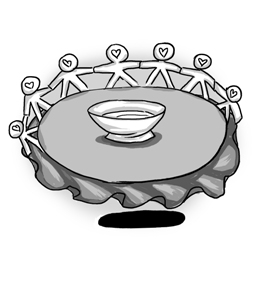
Illustration: Lu Ting/GT
I remember clearly that one year ago when the general public began to feel the seriousness and determination of the central government's resolution to fight extravagance and corruption among officials and State-owned enterprises (SOEs), they were firmly supportive of the new policy. Taxpayers hate public funds being wasted and abused by privileged groups on the three public expenses: cars, overseas trips and official receptions.
In the past year, people around the world have witnessed the achievements in the anti-graft campaign in China. Both tigers and flies have been caught and confined in the cage of rule by law. Officials of all levels have been exposed and punished. Word is spreading that an investigation into a super big "tiger" has long been underway, although no official announcements have yet been made.
It's obvious that the Party leadership and central government are firm and persistent in tackling corruption of any kind. Financially speaking, a large amount of public money has been protected and recovered. No doubt much more will be saved and better used in the future since the majority of officials dare not risk their political careers by violating regulations reiterated by the top administrators. They will be very careful and prudent not to leave any loopholes.
Thus there is now a new trend. Many officials in charge of SOEs and institutions are cutting budgets that may bring them trouble, which in turn, sometimes hurts the interests of the common employees and clerks. The cancellation of year-end dinner parties is a case in point.
Just like the traditional Chinese New Year's Eve dinner with family members, a year-end dinner party with co-workers creates a sense of belonging, which is very important for both the management and the common employees.
During the dinner, managers express their appreciation to the staff for their efforts and contributions in the past year and hope for bigger achievements in the year to come. The leadership toasts all the employees and usually it's a noisy and pleasant affair. Although it's not uncommon to see a few people get drunk and cause some trouble, the majority of workers look forward to this tradition to have the chance to celebrate with colleagues and leaders.
But in the past few years, with the help of social media platforms such as Weibo, there have been repeated exposures of extravagant banquets organized by State-owned companies and institutions, followed by news that those responsible for the expenses have been penalized. Officials try their best to avoid being caught for wrongdoing or negligence. Since dinner parties are an obvious target, it's natural for the management to cancel them to avoid possible trouble.
But we have heard complaints from grass-roots SOE employees about the cancellation of year-end dinners. They argue that the administrators are depriving their rights as workers in a company. The year-end dinner party should be the last thing to be cut from the budget since it's just a good tradition. Employees don't need Moutai liquor or Chunghwa cigarettes or shark's fin soup. They just need the opportunity to dine with colleagues.
Previously, there would also be big gift packages to take back home for Spring Festival. Many people like the feeling of bringing home a conspicuous package even if they don't need the goods inside. Once again this tradition creates a sense of belonging. People feel proud when they are well treated by the employer they are serving. Sometimes, family members are expectant about what you will bring back home. And among close friends and relatives, Chinese people are usually willing to tell others about their job's benefits or welfare policies. It doesn't necessarily mean that they are competing with each other or showing off.
So it's understandable to see why people would complain about the cancellation of their company's year-end dinner party, while at the same time they are still fully supportive of the anti-graft campaign.
I would say the management of any SOE should clarify the boundaries between extravagance and necessary expenses. Leaders can't make decisions without considering the opinions of the majority. Why can't a once-a-year dinner party be included in the budget plan so long as it's in accordance with the operation of the enterprise? After all, it's a small part of the whole welfare package for employees.
If it's just a dinner costing no more than 100 yuan ($16.53) per person, why is there fear of being exposed or punished? Moreover, if a company is profitable and contributes large revenue, the employees deserve to be rewarded and treated well.
I believe it's illogical to blindly cut the year-end dinner party. It's pure formalism to make a decision while totally ignoring tradition and the voices of the public.
The author is the managing editor of Global Times Metro Shanghai. fengyu@globaltimes.com.cn

